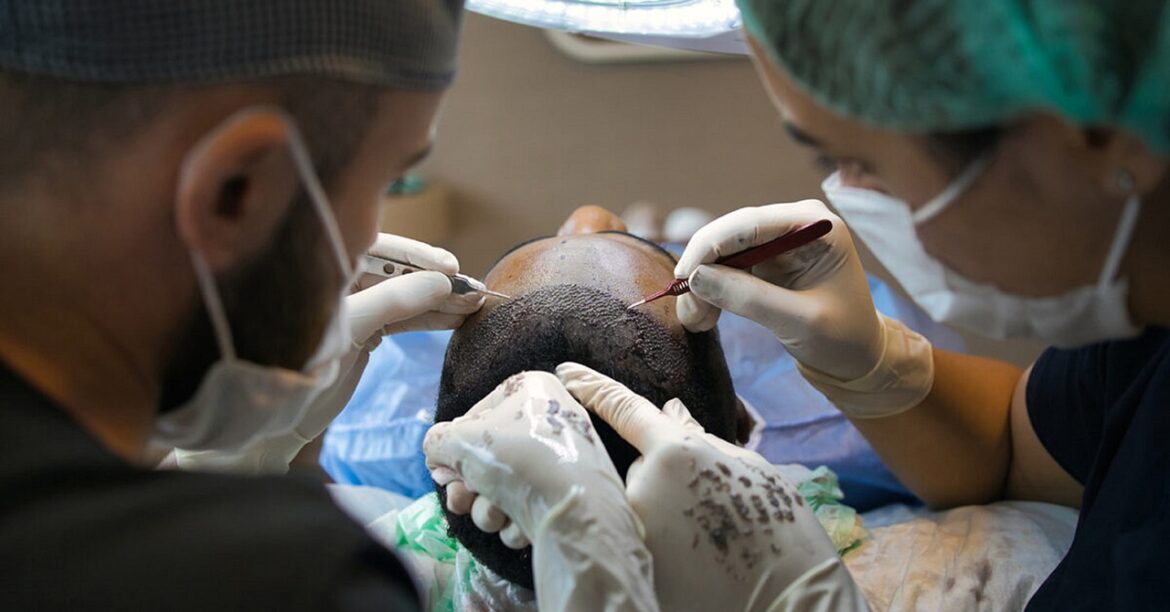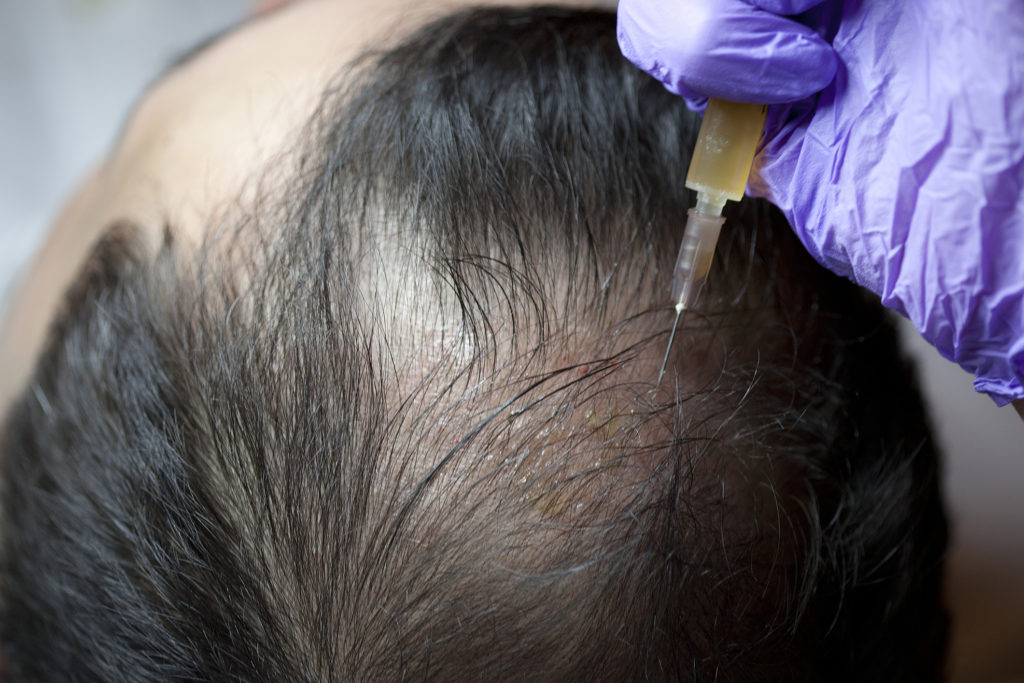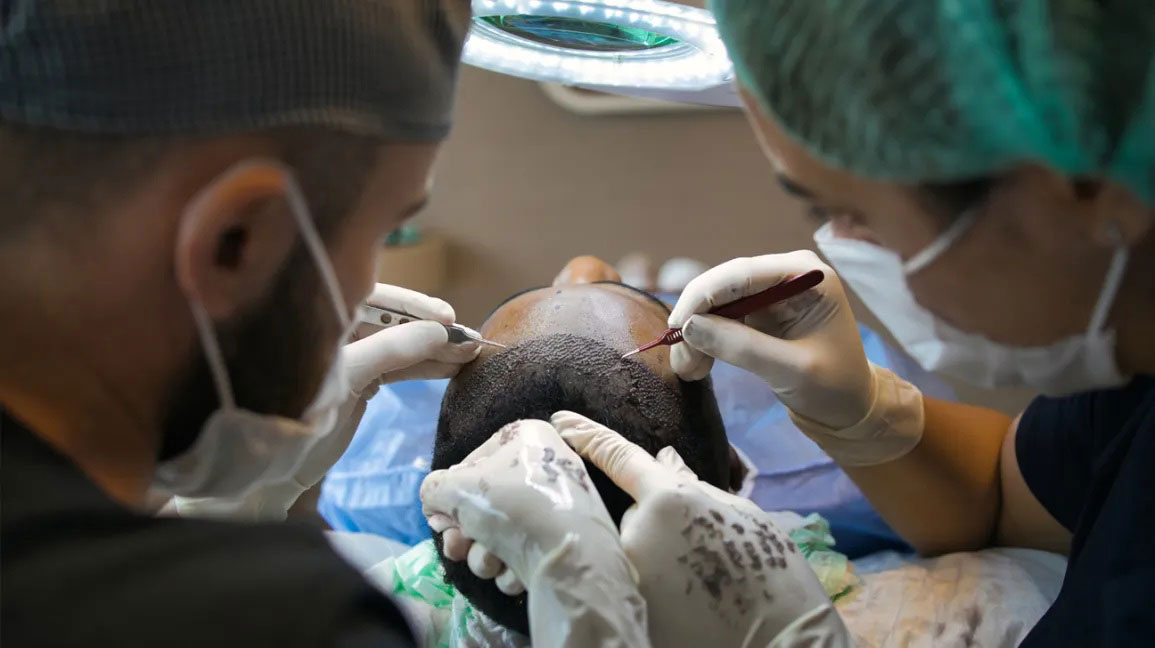Introduction:-
For many, hair loss is a relatively frequent issue that affects people of all ages, including men and women. Hair loss can develop gradually over the years or happen abruptly. Depending on the underlying cause, it may be temporary or permanent. Understanding the causes and available treatment choices is essential for properly managing any hair loss condition, be it bald patches, thinning hair, or diminishing hairline. In this blog, we will discover the causes of hair loss, how to recognize the signs and the range of potential treatments.

Causes of Hair Loss:
Hair loss has several causes. While some of the causes are uncommon, others are common. The causes can differ depending on the type of hair loss.-
1. Genetic:-
Androgenic alopecia, caused by the miniaturisation of hair follicles, is the most common type of progressive hair loss, affecting 30-50% of men and approximately 30% of middle-aged women.
2. Hormonal hair loss:-
This is the major cause of hair loss in men. It occurs due to the increased effect of DHT on hair causing progressive miniaturisation (thinning) of hair leading to hair loss.
3. Chronic illness:-
A Chronic illness like typhoid, dengue, malaria, TB, and thyroid disorders can lead to hair fall especially 2-3 months after the illness.
4. Post Pregnancy:-
Post Pregnancy hair loss is commonly seen due to hormonal changes in the body
5. Stress and Trauma:-
Many people notice a general loss of hair a few months after an emotional or physical trauma. Having major surgery is another possible reason for Hair Loss. This type of hair loss is temporary.

6. Medications and Treatments:-
Hair loss is a side effect of several medications, including antidepressants, blood thinners, and chemotherapy therapies. Drugs used to treat cancer, arthritis, depression, heart issues, gout, and high blood pressure can have adverse effects including hair loss.
7. Hairstyles and treatments:-
Tight hairstyles like cornrows or pigtails, as well as excessive hairstyling, can lead to traction alopecia, a kind of hair loss. Hair loss can also result from hot oil hair treatments. Permanent hair loss may result from scarring.
8. Nutritional Deficiencies:-
Like a plant that needs sunlight, our hair is attracted to vitamins and minerals. A bad diet lacking essential nutrients (such as protein or iron) will deplete your hair strands, leading to thinning and breaking.
Symptoms of Hair Loss:
Losing more hair than usual is the primary symptom of hair loss, but it can be more difficult to identify than one might imagine. The appearance of hair loss may differ greatly depending on the root cause of it. It may affect your entire body or just your scalp, and it can start slowly or rapidly. Some of the common symptoms of Hair Loss are:-
1. Gradual thinning on top of the head:-
This is the most common type of hair loss, especially along the crown or temples. In men, hair frequently begins to fall at the hairline on the forehead. Women generally have a broadening of the part in their hair. An increasingly common hair loss pattern in aged women is a receding hairline
2. Bald patches:-
Some people lose hair in circular or uneven bald areas on their heads, beard, or brows. These vary in size and might grow over time.
3. Sudden loosening of hair:-
Hair might become loosened in response to a physical or mental trauma. A few of the hair may fall out when combing or washing, or indeed with a gentle pull. This form of hair loss generally results in overall hair loss, still, it is temporary.
4. Itching or redness of the scalp in certain cases.
Treatment Options for Hair Loss:
1. Medications:-
The medications you apply to your scalp are usually the first course of treatment for hair loss.
2. Platelet-Rich Plasma (PRP) Therapy:-
PRP therapy includes collecting platelets from the patient’s blood and injecting them into the scalp to stimulate hair follicles and encourage hair growth. PRP treatment can help slow hair loss and encourage new hair growth.

3. Low-Level Laser Therapy (LLLT):-
Low-Level Laser Therapy (LLLT) devices deliver low-level laser light to the scalp, which increases blood circulation, stimulates hair follicles, and encourages hair growth.
4. Lifestyle Modifications:-
Adopting a healthy lifestyle, managing stress, avoiding tight hairstyles or excessive heat styling, and exercising good hair care habits can all help to prevent or reduce hair loss and improve overall hair health.
5. Hair Transplant:-
Hair transplant surgery is a medical technique in which bald or thinning areas of the scalp receive hair follicles transplanted from donor locations. A surgeon uses a blade or needle to create tiny holes in the scalp during a hair transplant process. There is no pain involved in the hair transplant surgery because it is done under local anaesthesia. A session may take four to eight hours, depending on the quantity of hair being transplanted. It is possible to transplant hundreds or thousands of hairs in a single session. It can produce long-lasting, natural-looking effects when used to restore hair in regions with substantial hair loss.

Here are some things to know about hair transplants:
1. Thick, grey or light-coloured hair tends to produce greater results than thin, dark-coloured hair.
2. About six months following the hair transplant treatment, the transplanted hairs start to look natural.
3. Hair Transplant surgery carries some dangers, such as bleeding and infection, just like any other type of surgery. Additional complications could be wound dehiscence, infection, skin necrosis, postoperative pain, itching, or unhappiness with the procedure’s result.
4. The degree of hair loss, the number of grafts needed, the skill and reputation of the surgeon, and the clinic’s location are some of the variables that can affect the cost of a hair transplant. When assessing the cost of hair transplant surgery, it’s critical to take the long-term investment and prospective advantages into account.
5. Although hair transplant surgery offers a long-term remedy for hair loss, it does not shield non-transplanted regions against more hair loss in the future.
6. Surgery for a hair transplant is not appropriate for everyone, prospects that have stable donor hair, enough hair density in the donor area, and reasonable expectations for the procedure’s results are the best. It is essential to have a consultation with a certified hair transplant surgeon to ascertain eligibility and go over expectations.
If you are looking for Hair Transplant in Dadar, Matunga, Bandra or Parel then skintown clinic is the best option for you.
Conclusion:
A common concern that can significantly affect one’s quality of life and self-esteem is hair loss. People can actively address hair loss and regain confidence in their appearance by learning the root causes, recognizing the signs and symptoms, and exploring the available treatment choices. Getting expert advice and assistance is essential to getting the best results possible when managing hair loss, regardless of the approach you take—topical, oral, surgical, or lifestyle changes. Recall that there are practical remedies available to assist you in recovering a full, healthy head of hair and that you are not alone in this path.
To know more about Hair loss and its treatment consult Dr Bhushan Bawanakar at Skintown Clinic. Dr Bhushan Bawankar has been trained at Istambul, Turkey for Hair transplant procedures. Visit us at Skintown Clinic.
Call now:- +91 99238 16392



